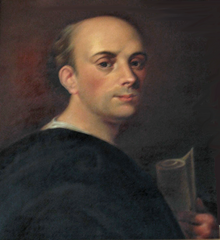Scipione Piattoli
| Scipione Piattoli | |
|---|---|

Scipione Piattoli, by Marcello Bacciarelli
|
|
| Born |
November 10, 1749 Florence, Grand Duchy of Tuscany |
| Died | April 12, 1809 (aged 69) Altenburg, Germany |
| Nationality | Italian |
| Other names | Urban |
| Occupation |
|
| Known for | drafting of the Constitution of May 3, 1791 |
Scipione Piattoli (Italian pronunciation: [ʃiˈpjoːne ˈpjattoli]; November 10, 1749 – April 12, 1809) was an Italian Catholic priest—a Piarist—an educator, writer and political activist, and a major figure of the Enlightenment in Poland. After ten years as a professor at the University of Modena in Italy, he migrated to the Polish-Lithuanian Commonwealth, where he became associated with several magnate families—the , Lubomirskis and Czartoryskis. He was a member of the Duchess Dorothea von Medem's court in Courland (Lithuania) and of King Stanisław August Poniatowski's court in the Commonwealth.
Piattoli was politically active in Warsaw during and after the Four-Year Sejm (1788–92). He served as intermediary between the reformist Patriotic Party and King Stanisław August Poniatowski, and as an aide to the King (1789–93). He is best remembered for his participation in drafting the Constitution of May 3, 1791, a milestone act in the history of Polish political legislation. He was one of the organizers of the Kościuszko Insurrection against Russian influence in 1794, which was the last armed struggle to be held under the banners of the Commonwealth. After the Third Partition of Poland in 1795, Piattoli was interned by the Austrians for several years, together with another Polish activist of the Constitution movement, Hugo Kołłątaj. Freed in 1800, he worked several years with Polish and Russian statesman Prince Adam Jerzy Czartoryski in the service of Russia, before retiring to Courland.
...
Wikipedia
